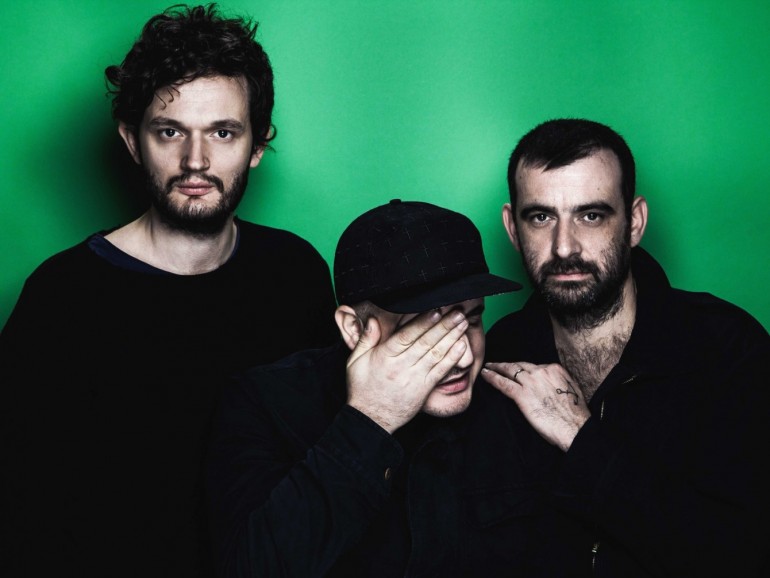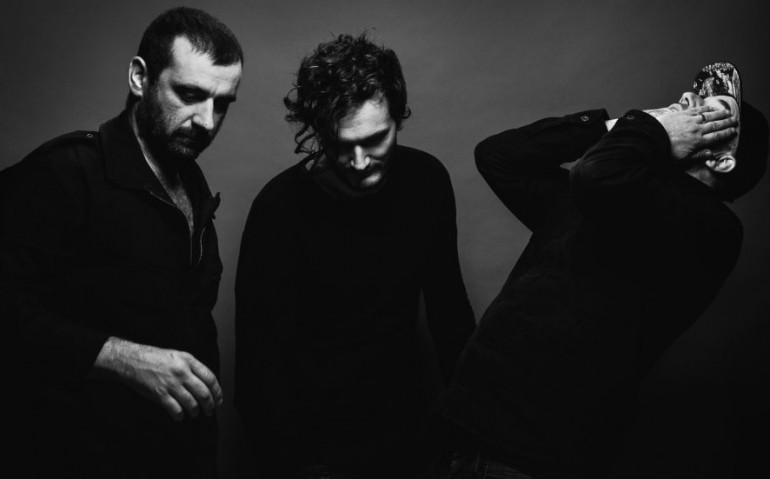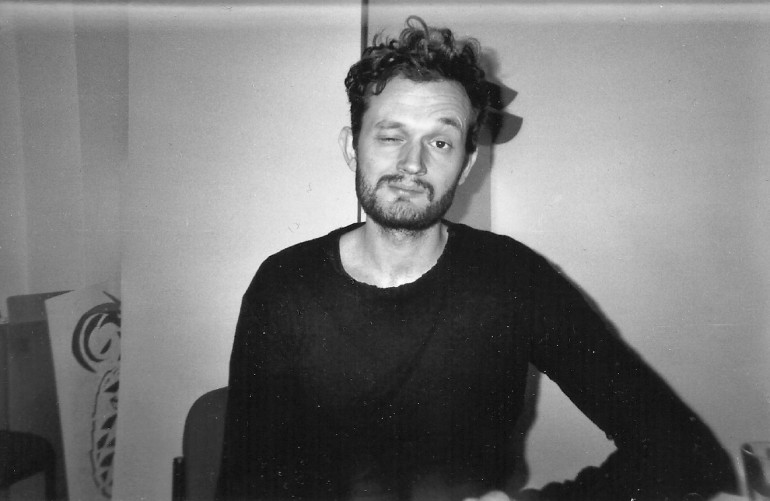
Photo by Flavien Prioreau
For some people it might not be that special if an artist is from the same region as they are. At least if you’re from Manchester, Berlin or New York. For me, it is. Luckily the artist who comes from the same region as me, has got a new record out with – some might call it electronical supergroup – MODERAT. I meet my local hero on a February day in Berlin at the Monkeytown Records office, which also houses the studio where the MODESELEKTOR and MODERAT albums are made in.
Sascha Ring aka APPARAT grew up in the Harz region, an mountain areal in the very west of East Germany. It is a tourist region and for tourists it might be nice to be there for a few days. But for teenagers growing up there, it has very little to offer. At least if you’re not interested in being stuck for three days dancing to chavy ‘Hard Tekkno’, as they call it (but that’s another topic) poor pills expelled as MDMA or even worse, meth. Sascha Ring grew up in the same area, only 20 years before me. Back then, the scene was slightly different.
After already chatting away the first minutes of our slot with stories about our mutual home, I find out what a renowned musician like Mr. Ring would have to say about the changes between his and my adolescence in the same place:
‘Internet changed everything of course, everything is better connected. We had to lay out flyers on the previous parties, to have a chance that the next one will be even noticed. Today it’s so much easier to get through to people. But if they’ll even notice it in the overkill of information is a different question. But it’s easier to grow up in the province now, because you’re better connected to the world. That wasn’t the case in my youth. Province meant being disconnected from things that happened in the rest of the world.’
The feeling of being lonely in the big city after growing up in the East German countryside hasn’t changed.
Having grown up in the East German province with internet hasn’t made things much easier I tell Sascha. For me the internet showed me the possibilities I couldn’t face in my hometown. For Sascha, the realization that his hometown wasn’t the right place to stay in, came way later than mine:
‘I have to admit that I haven’t felt the urge to move from the province until I reached a certain age. I didn’t know what was out there. Someday, I realized, that the resources have depleted and moved very fast to Berlin. That was a real shock for me, I didn’t know the world through the internet’.
‘Suddenly people ate drugs and were pretty nice to each other.’
The bond that keeps Sebastian, Gernot and Sascha going as MODERAT is their mutual musical socialisation through 90s techno. I explain to Sascha that I find it hard to get the magnetism of the 90s, that bonds people even though they experienced techno in different Eastern German towns. For Sascha, it’s pretty obvious:
‘In the past thirty years there have been only two youth cultures that were revolutions. Punk and techno. Maybe also Hip-Hop, but I don’t know if it has a specific philosophy or politics. Techno has been such a massive revolution, because it was so unpolitical. It was about a community, about people being together in a room for pretty long and getting along pretty well with each other. In 90s Quedlinburg there was the first refugee problematic with a lot of Nazi shit happening. There was a left pub and between that was a lot of stress. But techno sort of solved the problem. Suddenly people ate drugs and were pretty nice to each other. Today’s party culture is very different. A DJ has a very different importantness and is considered a star. That has been way different back then, he stood in a dark corner. Techno was about the music, not the person. Everything was pretty abstract.’
We are talking about the early 90s in Quedlinburg here. But in bigger cities like Berlin, techno had already created a star cult back then. In 1994, Marusha, who had an underground techno radio show, topped the charts with her version of Somewhere Over The Rainbow. Even conservative politicans wanted their own waggon at the once so edgy Love Parade:
‘People forget that there’s been a phase where electronic music was taking place in the charts and then turned underground. Now it’s coming back into the mainstream, with the whole EDM shit that is happening here.’
‘What we do can only take place on a high level if there’s a certain infrastructure behind it.’
Of course, Berlin’s touristy party scene is playing it’s part of the star cult, not only in EDM, but also with DJs such as Marcel Dettmann or Ben Klock around. But for a band like MODERAT, those changes can also be real chances.
‘Berlin just grew up. Back then it was ‘Do It Yourself’ and ‘Do It For The First Time’. Everyone just dabbled around. No one knew how record labels work. Now everyone learned how its done. Somehow it’s sad, that this spirit, the romance is gone. But on the one hand it’s good for a member of the band Moderat. What we do can only take place on a high level if there’s a certain infrastructure behind it. Where people work who know how to do it. I realized that with this second album ‘II’, since the beginning of this office (Monkeytown Records) such a release is way more calcuated.
We have to think about what to do in England to make it work there. In the past we just did it. That was great. But that’s how the whole city works. Clubs are businesses. What has been left aside is the will to take in riskes. Bookings have become more boring and less adventurous. But I haven’t been out in a while so I can’t really say how the clubs are like inside.’
‘Berlin had a lot more of what it has now but it’s still pretty permissive in any possible way’
Sounds as if not just Berlin, but also Sascha grew up. The city that once overdrove him in the mid 90s became a calculatable metropolis. I want to know whether he would still decide to move to Berlin if he was 18 today, as I am.
‘If you see a bit of the world you realize that Berlin is for newbies the same, as it was to me once. Back then, it had a lot more of what it has today, but it’s still pretty permissive, in any possible way. Even if you come from London it’s a total paradise. I would definititely move to Berlin again. It would still have the same effect to me as back then.’
Today we have a way broader definition of electronic music as back in the 90s. But Sascha doesn’t care about the current trends in the electronical scene:
‘I’ve never been interested in any trends. Gernot is more up to date. He always knows that 17 year old Scottish producer who just made the sickest beat. I know that musically there’s still a huge pool of interesting new music. It would be ignorant to say that everything was better in the old days. There’s so much great stuff around. Through the internet and stolen software it is possible for anyone to make a record and start a career. I don’t know whether you should call it luck or bad luck, but that goes up to the point where you’re an AVICII, who becomes a multi millionaire with the internet and stolen software. Tendentially, there is still great music out there, you just have to search very hard for it. And I also believe that there are great clubbing places in Berlin, where I don’t even know from. They just open and reopen within time, which is a healthy natural process.’

‘For many people music isn’t the first reason to go into a club. But maybe now that’s changing through Tinder’
In an old interview, Sascha said that what he hates about the modern party culture is ‘that everyone just wants to get wasted and hook up’. Confronted on this quote, Sascha seems a bit embarrassed:
‘I don’t know why I once said that. That’s why it’s called partying. I did the same thing. For many people music isn’t the first reason to go into a club. But maybe now that’s changing through Tinder. A club isn’t a contact exchange. I was probably a bit pissed off, because it doesn’t matter at all, what you play. Most people don’t appreciate it at all. I don’t want to give examples, but there are clubs in Berlin, where it’s more or less important, who plays there.
‘I’ve tried to embrace Jazz.’
Earlier in our conversation APPARAT revealed that he hasn’t been clubbing for a long time. He also reduced his amount of DJ sets, unlike his MODESELEKTOR colleagues. This doesn’t hinder the creative process in the studio, though:
‘Gernot is the one who wants to do the hot shit in the studio. I am just listening to 80s music at the moment, I’ve even tried to embrace Jazz this time. But it didn’t work, I’ll try again in a year. I always set myself these missions, next week is Krautrock week. Szary likes anything, we’re all having a pretty much broad view anyway. But you always plan the studio time three, two years in advance without knowing what everyone is going to be into then. Only getting to a mutual point is taking three or two months time. And then everyone will put his thoughts into the pot.’
III has both – anthemic pop appeals and killer dancefloor beats. Sascha still doesn’t want to say what sort of atmosphere would suit to the record as he doesn’t want to generalize his work:
‘We turned away from aiming at the dancefloor while making music a long time ago. But for me, it’s something different because of the singing, it’s a very own, introverted level. Gernot and Sebastian hear the record in very different layers. But I could tell which drink our band would be, we got asked this earlier today. We’d be an ecstasy bowl, but just with the fruits in a glass. They soak up and are the essence of the bowl.’
‘Going through the underground scene put a small critic in us’
Combining pop with electronic aspects is still a pretty rare attempt of making music within the often rather advantgardistic electronic scene. But MODERAT aren’t afraid of people that might criticize the cheesiness or many vocal parts of III:
‘It’s obvious that we like big gestures and pop. We all grew up with DEPECHE MODE. But going through this underground scene put a small critic in us that always tells us that something is too cheesy or obvious. The knot only tied up with ‘Bad Kingdom’. I made a draft of the song and told the others to not laugh. That was my attitude. No one way amazed, but we carried on working on it. In the end it became a big song that sort of made the whole album.
Then I realized that you have to ignore your inner critic. That’s why I sing so much on this record, I thought to myself ‘Let It Go’. You have to do what’s on your mind and not think about the consequences. The thought of consequences should be completely ignored while being in the studio. Otherwise you couldn’t capsulate yourself in your small bubble to do the things you want to. And don’t read reviews.’
In the last minutes of our interview time we are talking about the changes that happened within the techno scene back at home. I brought a local Schnaps called ‘Schierker Feuerstein’ with me. After Sascha refuses to drink it right away (He still had a hangover from a Berlinale party the previous day) we both recall memories from home to its iconic herbal taste. To my question if he had any advice for the young people suffering from the tristesse and drug hell there, Sascha has only one advice:
‘Move away. It’s sad if no one lives in the Harz anymore, but for some things in life you need the advantages of a big city. If I didn’t move, I wouldn’t be what I am today.’

Shot via disposable camera by Louisa Zimmer
As we arrange to go out on a Techno party at home during christmas, I wonder, what and where I’ll be in 20 years. Time will tell in the end.
—
